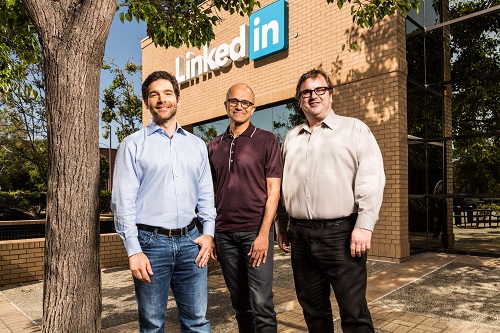On Monday, June 13, Microsoft made a surprise announcement, saying that it had purchased the social media site LinkedIn for $26.2 billion – Microsoft’s biggest acquisition ever. The move has many wondering why Microsoft would make such a large investment and what the future of each company will look like. Although many of the details are speculative at this point, we’re examining these questions as well as what the Microsoft LinkedIn deal means for businesses.
The Reasons Behind the Deal
The purchase of LinkedIn was the first acquisition for Microsoft CEO Satya Nadella. In an email, he explained the move, saying:
“With the new growth in our Office commercial and Dynamics businesses, this deal is key to our bold ambition to reinvent productivity and business processes. Think about it: How people find jobs, build skills, sell, market, and get work done and ultimately find success requires a connected professional world. It requires a vibrant network that brings together a professional’s information in LinkedIn’s public network with the information in Office 365 and Dynamics.”
Others say that Microsoft sees LinkedIn as a way to access a professional network of over 433 million members, and if they can leverage that platform then they can drive usage for their many business apps and programs. Some say that this is part of a broader shift that has been taking place for a while but had gone relatively unnoticed by consumers – a shift away from PC software to online services for business owners.
The Future of LinkedIn and Microsoft
Although LinkedIn will operate as “a full independent entity within Microsoft” we are sure to see integrations in the months and years to come. However, experts say that these integrations will likely roll out slowly, for fear of alienating LinkedIn users.
Many of the possible integrations were outlined in a presentation to investors. This includes:
- Gathering data to create complete professional profiles, which you can call up using Microsoft products like Outlook or Cortana.
- Creating a more intelligent newsfeed so professionals can stay connected with what is happening in their network, industry, and profession – and integrating the LinkedIn newsfeed with Office 365.
- Connecting the LinkedIn Sales Navigator with Microsoft’s Dynamics CRM to improve social selling.
- Providing insights about your employees and team members to better understand their capability and productivity.
- Integrating LinkedIn Learning (Lynda.com) with Office to provide educational experiences and on-demand courses.
What The Microsoft LinkedIn Deal Means for Businesses
First and foremost, the acquisition demonstrates Microsoft’s shift away from the consumer market and toward business customers. It reaffirms that Microsoft is putting businesses first in product creation, so we should see even more online and cloud-based services that improve productivity, efficiency, and connection.
While those who don’t like Microsoft products may find the acquisition annoying, many experts say that the move will be good for businesses. For example, Lee Odden, the CEO of TopRank, says,
“I think the combination of Microsoft, especially Office 365 and Dynamics, with LinkedIn’s network will create opportunities for companies and marketers on several levels. Empowering individuals with customized news, learning and access to relevant professionals, to increased advertising options and sales through Dynamics CRM and LinkedIn Sales Navigator, are a great start.”
The Wall Street Journal echoes this sentiment, saying, “We now work by toggling between our productivity software and our social networks. But why should the two be separate?”
When announcing the acquisition, the presentation to investors pointed out that Microsoft and LinkedIn share a common mission of empowering people and organizations. If the acquisition plays out correctly, it should create several products, services and features that empower small businesses and improve business operations.

